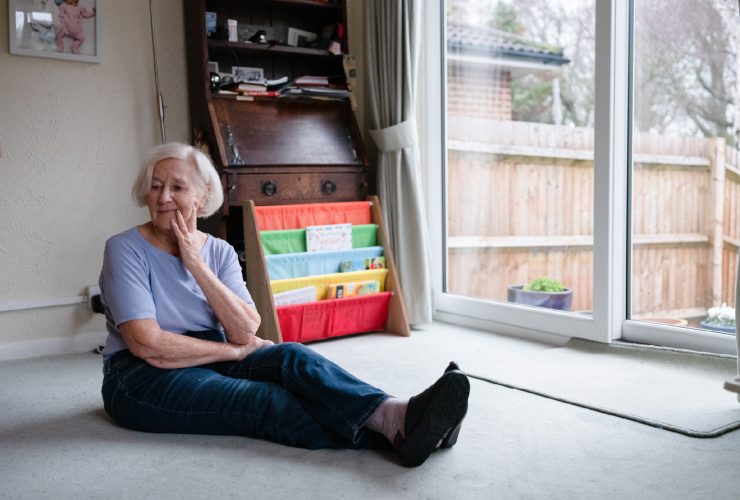
Housing associations and home adaptations: finding ways to say yes – key messaging
A new report for Housing Associations (HAs) aimed at improving adaptation services for disabled customers is now available – and it could help your organisation transform this service area.
Housing Associations and Home Adaptations: Finding Ways to Say Yes written by Foundations (the national body for Home Improvement Agencies in England), contains guidance for HAs so that they can optimise the way they support tenants to benefit from Disabilities Facilities Grants (DFG). It has been written with support from Habinteg, Anchor Housing and Taylor Wimpey.
Headline messages
Adaptations can transform the way people live:
- They help people stay in their own homes, give them back their dignity and confidence, make homes safe, reduce falls, overcome the fear of falling, improve life for carers and family members, reconnect people with the outside world, increase wellbeing and mental health, and help people retain or gain employment.
- They also save money for landlords by creating stable tenancies, generate considerable cost saving for health and care services by keeping people independent in the community, and produce national economic benefits by helping more people to work.
- Major adaptations and DFG – The central government DFG allocation doubled after 2015/16 to reach £573 million by 2021/22. The baseline allocation will be £573 million until 2024/25.
Foundation’s report and toolkit assists HAs in developing new ways of working to meet the needs of customers, connecting housing with health & care and demonstrating understanding and conformity with the Social Housing White Paper objectives. The report refers to DFG guidance from 2018, as it was written prior to new DFG guidance being published in March 2022. The new DFG guidance refers to the Foundations report for ‘how’ to deliver DFG partnerships with HA providers.
The original aims of the of the study, to inform the Foundations report, included:
- To look in depth at how adaptations are funded and delivered in the sector – including minor adaptations and use of the Disabled Facilities Grant (DFG).
- To examine how funding arrangements might be improved and the delivery process made quicker and more effective.
- When adaptations are not the right solution, to see how the moving process might be improved.
- To encourage a longer term and more strategic view of home adaptations.
The report provides recommendations for associations, local authorities, central government, and the Housing Regulator to sort out the confusion about funding and improve the speed and effectiveness of home adaptations delivery.
It provides practical solutions to put disabled and older tenants at the heart of decision making, an inclusive approach to services, and for home adaptations to be part of the new customer-focused inspection regime.
The report directly correlates with requirements of the Social Housing and Adult Social Care Reform White Papers, providing best practice and solutions:
Chapter 6: To have a good quality home and neighbourhood to live in, point 115:
- Supporting positive mental and physical health 115 – we know that around 24% of working age disabled people live in social housing. It is therefore vital that these people get the support they need. In 2020/21 we have provided a total of £505 million for the Disabled Facilities Grant (DFG). This capital grant, administered by local authorities in England, can contribute to the cost of adapting an eligible disabled person’s home. Eligible applicants can include older people, mentally or physically disabled people, as well as those with autism and learning difficulties. The DFG supports the installation of adaptations such as stair-lifts, level access showers and ramps; all things which can help enable people to live safely and independently at home. People of all ages can apply to their local authority for a DFG. In 2016/17 over 33% of recipients of the funding were housing association tenants, which equates to over 15,000 homes being improved. Local authorities are under a statutory duty to provide home adaptations to those who qualify for the grant, which the individual local authority funds.
Chapter 4: Providing the Right Care, in the Right Place at the Right Time, point 4.9:
- We also need to actively shape the specialist housing market – to establish and consolidate local strategic leadership, and create the right incentives for local areas and housing providers to invest, including in new and innovative models of provision. We will therefore invest at least £300 million for the period 2022–23 to 2025–26. This new investment will allow local authorities to deliver the vision set out in this white paper by integrating housing into local health and care strategies, with a focus on boosting the supply of specialist housing and funding improved services for residents. This in turn will drive increased confidence in the social supported housing market, stimulating a positive cycle of further innovation and private investment.
Benefits
Housing partnerships were recommended in the DFG Review (2018) to co-ordinate local strategy about adaptations and moving home for disabled and older people. The Social Care and Integration White Papers published in late 2021 and early 2022 also recommend stronger place-based planning and closer integration of health, care, and housing.
In a housing sector where 54% of tenants have a long-term illness or impairment, creating a more inclusive housing stock should be a central part of overall strategy.
The current fragmentation of adaptation services between HAs, social care OT services and DFG teams makes it very hard to measure outputs, outcomes and impact and give a clear picture of what is happening in the HA sector. If HAs bring together services for disabled people in a more coherent way, it would allow better measurement of outcomes and feedback loops for continued service improvement.
The report provides solutions and ideas to the concerns HAs have over the existing funding and delivery process.
Issues include:
- Limited budgets (including awareness/availability of Landlord grants)
- Often a single aids and adaptations staff member
- Dealing with numerous local authorities – in some cases a 100 or more:
- Paperwork – different in each authority
- Funding – contributions requirements vary
- Contractors – many authorities want three quotes even if the
association has its own in-house contractors - DFG installations do not always fit with own specifications making them hard to repair and maintain.
- Warranties and maintenance arrangements vary.
- Not always told that work has been completed to update asset register.
Using consultation and co-production techniques the Inclusive Living Toolkit brings staff and residents together from different parts of one association, or within a group, to develop an inclusive living strategy that will work across strategic areas. The report creates opportunities for HAs to consider how their existing and new homes can be adapted to cater for the diverse needs of their customers.
ARK and Foundations are working in partnership to support HAs and help them to implement the recommendations of the report. To find out more contact info@foundations.uk.com

Neil Cox
Senior Consultant
Neil has worked in construction for over 20 years, with experience with the engineering environment as well as in housing.
Neil’s key area of expertise lies within delivering and developing repairs & maintenance, compliance, building safety, asset management and latterly sustainability services and strategies.
News & Insights
Read the latest housing sector news, blogs, and commentary from ARK.

Building Safety
By Luke Beard ·The deadline for registering an existing higher risk building (HRB) with the regulator and submitting the required key building information …

Are you ready for the Supported Housing (Regulatory Oversight) Act 2023?
By Nick Sedgwick ·If you are a supported housing provider, you need to be aware of the new regulations that are about to …

International Women’s Day 2024
By Chris Seeley ·The theme of International Women’s Day 2024 is the question ‘What does it mean to truly inspire inclusion?’, we asked our …
Subscribe to our newsletters for the latest industry insights
Our newsletters and reports will keep you updated on topical issues from the sector as well as what’s happening at ARK.
